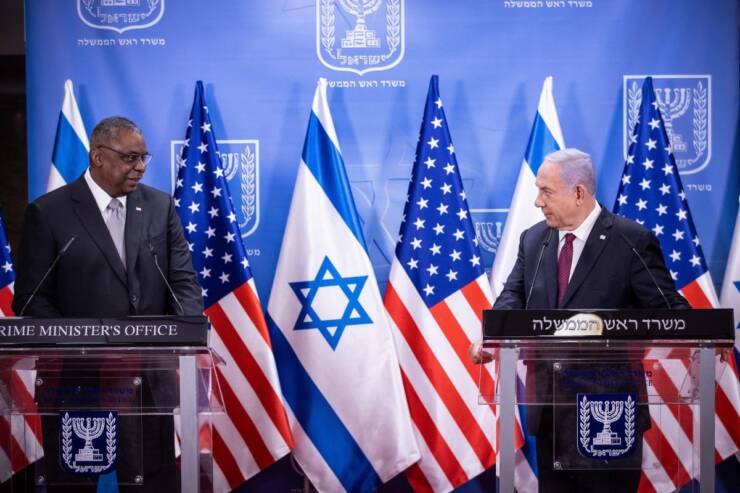
Tel Aviv. The hasty withdrawal of the US from Afghanistan and the way Washington has been handling the negotiations with Iran on a new nuclear deal, it’s becoming a matter of grave concerns in Israel and some Gulf countries. The International Atomic Energy Agency has confirmed that Iran is accelerating uranium enrichment bringing it closer to developing nuclear weapons. The agency added that the state has added another centrifuge cluster that enriches uranium to a level of about 60%.
“The US is fooled by the Iranians about their military nuclear program. Add to this the fiasco caused by their hasty unorganized withdrawal from Afghanistan, and you see a very disturbing situation” an Israeli defense source said. In a paper prepared by Brig. General (ret.) Yossi Kuperwasser for the Jerusalem Centre for Public Affairs, the Israel experts says that the radical Islamic regime in Iran is carefully pushing an escalation with Israel to deter the new government from continuing to carry out attacks on Iranian targets in Syria. At the same time, Iran is pursuing a similar policy with the United States to persuade the US administration to be more flexible in its positions on the nuclear deal.
Kuperwasser, who earlier served as the head of the research division in the Israel Defense Forces (IDF) – Military Intelligence Division and Director General of the Israel Ministry of Strategic Affairs points out, “There are three factors behind Iran’s aggressiveness. First, Iran’s growing sense of distress which comes from several sources: continued US sanctions; the American refusal to accept the Iranian outline for the United States’ return to the nuclear deal; the unrelenting attacks attributed to Israel that undermine Iran’s nuclear infrastructure and its strategic efforts to entrench in Syria and use its territory to strengthen Hezbollah; and the persistent unrest within Iran and in countries it seeks to control or influence (Syria, Lebanon, Yemen, and Iraq).”
The Israeli expert writes that Iran assumes – with good reason – that the responses to its escalation will be limited. “The Biden administration’s adamant refusal to say in the Iranian nuclear context that all options (including military options) are on the table and that the United States will not allow Iran to achieve the capability to produce nuclear weapons (and not only prevent Iran from acquiring nuclear weapons) are seen in Iran as an expression of American weakness, limiting the boundaries of Israeli activity. The weak international response to hardliner Ebrahim Raisi’s inauguration as president, especially on the part of Europeans, who sent a representative to attend Raisi’s inauguration ceremony, and Russia’s mobilization of forces to defend Iran, including its willingness to intercept missiles that Israel launches at Iranian targets in Syria, all reinforce this sentiment.”
Kuperwasser reveals that Iran is also investing in high-speed explosive sea drones and the development of advanced cyber capabilities. They market these means to the compliant militia organizations throughout the region who use them to advance their common goals, while Iran preserves the ability to deny their direct responsibility for the actions taken by these organizations. “Israel’s commitment not to act against Iran without coordination with the United States, especially under the risk-averse Biden administration, could further strengthen Iranian security.”
Last week Israeli defense minister released information the proved that the Israeli intelligence organizations know exactly what goes on in Teheran. The Israeli minister said that Amir Ali Hajizadeh, Commander of the IRGC’s Air Force, is behind dozens of terror attacks in the region employing UAVs and missiles. “For the first time ever, I will also expose the man who is directly responsible for the launch of suicide UAVs – his name is Saeed Ara Jani and he is the Head of the IRGC’s UAV Command. The UAV command conducted the attack on Mercer Street. Saeed Ara Jani plans and provides the training and equipment to conduct terror attacks in the region.”
Gantz added that Iran has once again proven to be a global challenge, a regional challenge and also a challenge to the State of Israel. Iran is responsible for dozens of terror attacks across the Middle East, while controlling its proxies in Yemen, Iraq and additional countries. Iran has violated all of the guidelines set in the JCPOA and is only around 10 weeks away from acquiring weapons-grade materials necessary for a nuclear weapon. Now is the time for deeds – words are not enough. It is time for diplomatic, economic and even military deeds – otherwise the attacks will continue.
Israeli military sources said that Washington does not understand the situation in the Middle East. “Iran is moving fast into Lebanon and has an increasing influence in Syria. If the US sees the Middle East as an asset in its global strategy, it should read the map and understand that its actions can result in very serious implications “one source said. In recent days there are growing voices in Jerusalem that criticize the Biden strategy. “The hasty withdrawal from Afghanistan and not understanding the situation in Iran and the middle east, may backfire as to the US interests ” one source said.








